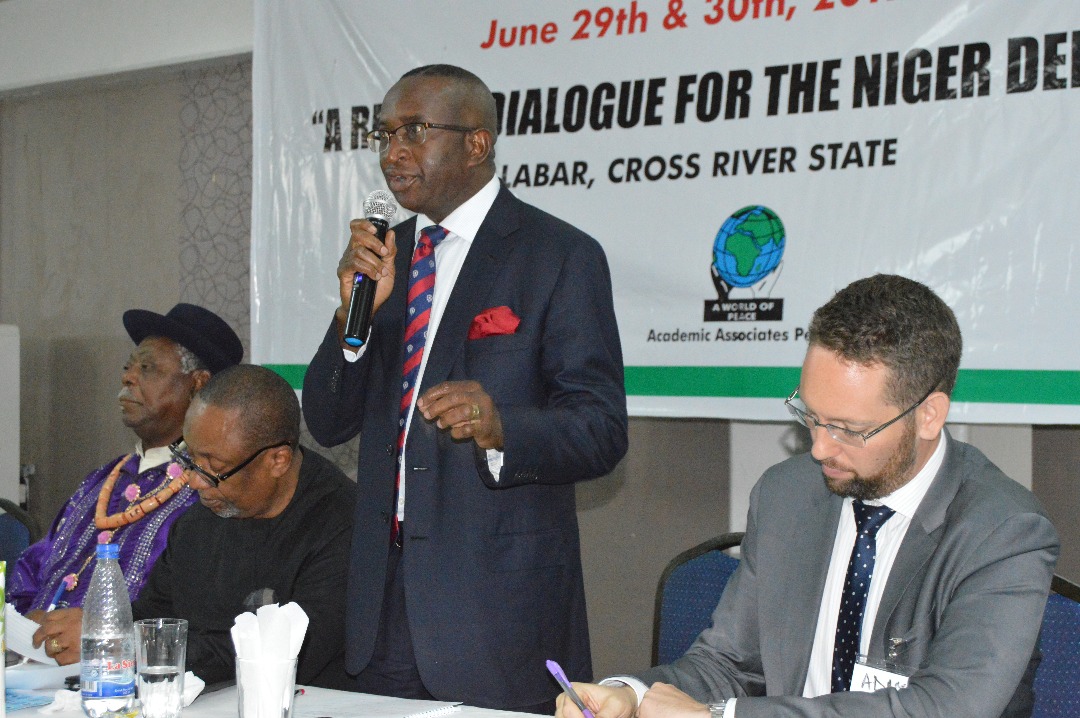
24 Sep Strengthening Internal Security through Youth Empowerment in Nigeria: The NDDC Experience
STRENGTHENING INTERNAL SECURITY THROUGH YOUTH EMPOWERMENT IN NIGERIA: THE NDDC EXPERIENCE BY VICTOR NDOMA-EGBA PRESENTED AT THE NATIONAL INSTITUTE FOR POLICY AND STRATEGIC STUDIES, KURU FOR PARTICIPANTS OF SENIOR EXECUTIVE COURSE NO. 40, 2018, ON 30, AUGUST 2018
Introduction
At the dawn of civilization and the establishment of nation states, the primary purpose of government became and has remained the security and welfare of its people. The essence of the state, particularly in modern times is the maintenance of law and order, peace and security, and the creation of political conditions that would enhance the welfare of the citizenry. At the center of maintaining law and order is internal security. Therefore, internal security is of prime importance in the national life of nation states. On a general note, security simply suggests freedom from the danger of threats, safety-or the ability of the state to protect and promote its cherished values and legitimate interests, and enhance the well being of its people. While the general concepts of keeping a nation secure are not new, methodologies and strategies to achieve and maintain the highest possible desired state of security have been consistently developed over the modern period to this day. However, the concept of national or internal security is very difficult to define because the root term, security, has remained a contested concept. In other words, it has no universally accepted definition due to its many facets arising from ideology and timeframe being addressed, as well as the locus of analysis.[1]
Internal security (IS) is variously defined as “the act of keeping peace within the borders of a sovereign state or other self-governing territories, generally by upholding the national law and defending against internal security threats”[2]. Responsibility for internal security may range from the police to paramilitary forces, and in exceptional circumstances, the military itself. For Walter Lippman, a nation is secured to the extent that it is not in a position to lose core values, lives, property and liberty. Internal security also refers to the requirement to maintain the survival of the nation-state through the use of economic, military, political power and the exercise of diplomacy[3], while Imobighe (1990), conceptualizes internal security as the freedom from or the absence of those tendencies which could undermine internal cohesion and the corporate existence of the nation as well as its ability to maintain its vital institutions for the promotion of its core values, socio-political and economic objectives while also meeting the legitimate aspiration of the citizenry. It implies freedom from danger to life and property and the presence of a conducive atmosphere for the people to pursue their legitimate activities within the society.[4]
From the above it is clear that internal security simply suggests freedom from threat and the ability of the government to create and sustain an atmosphere conducive for the pursuit of economic interests by the population without interruptions from anybody.When there is a threat, it includes the ability of the government to quickly intervene to minimize its impact on the citizenry. Furthermore, it also includes the capacity of the government to create and maintain agencies and mechanisms, as well as institutions that would guarantee freedom from danger.[5]
The threat to life and property be it from armed bandits, militants, herdsmen and farmers clashes, communal crises, Boko Haram insurgency, civil disturbances and other disruptions of free movement and peaceful assembly are symptomatic of the failure of internal security.
The return of democratic rule in 1999 gave people the freedom to vent their disaffection with the existing social, political and economic order. This consequently led to the proliferation of militant ethnic and religious movements collectively referred to as militias, starting from Odua People Congress (OPC), Arewa People’s Congress (APC), Bakassi Boys, Egbesu Boys of Africa (EBA), Movement for the Actualization of the Sovereign State of Biafra (MASSOB), Niger Delta Peoples’ Volunteer Force (NDPVF), Movement for Emancipation of the Niger Delta (MEND), “Boko Haram” and various other groups that often do not have a specific label or designation. The activities of these groups pose considerable economic, social, human and political threat to the sovereignty and co-existence of Nigeria and thus a threat to internal security. A general look at the activities of the members of these groups shows that they sometimes not only usurp the law enforcement functions of the police, but also wear provocative uniforms and openly brandish offensive weapons without any authorization. Therefore, these activities seriously violate general laws that were made for ensuring due process in law enforcement and criminal justice administration and for preserving public order and peace in the Nigerian society[6] as well as the supposed monopoly of the State of instruments of coercion.
Unfortunately, Nigeria’s National Security Policy is outdated. It has relied on ad-hoc measures, fire brigade approaches, excessive use of force and disruption of free movement of persons, goods and services characterized by irritating road blocks, all of which do not enjoy the buy in of citizens. This partly explains why the internal security of the nation has not been very effective. ‘‘The national security policy of Nigeria since 1960 has been tied to the issue of dealing with the problem of external aggression and addressing internal upheavals. While the rest of the world now recognizes other variables that affect national security, Nigeria continues to adhere to an outdated model. In the United States, Canada and Europe, national security means national power and it is handled as such. This was eventually expanded to include economic and even other concerns’’- National Security Policy in Nigeria by Emmanuel Jatau.[7]
[1]https://www.ajol.info/index.php/ijah/articles/view/110242 accessed 13/8/18
[2]https://www.definition.net/definition/internal+security accessed 13/8/18
[3] Culled from https://www.ajol.info/index.php/ijah/articles/view/110242 accessed 13/8/18
[4] TA Imobighe (1990), quoted in DO Egbefo& HA Salihu‘Internal Security Crisis in Nigeria: Causes, Types, Effects and Solutions’https://www.ajol.info/index.php/ijah/articles/view/110242 accessed 13/8/18
[5] DO Egbefo& HA Salihu ‘Internal Security Crisis in Nigeria: Causes, Types, Effects and Solutions’ https://www.ajol.info/index.php/ijah/articles/view/110242 accessed 13/8/18
[6]https://www.ajol.info/index.php/ijah/articles/view/110242 accessed 13/8/18
[7]https://www.ajol.info/index.php/ijah/articles/view/110242 accessed 13/8/18
Download Full Document



No Comments